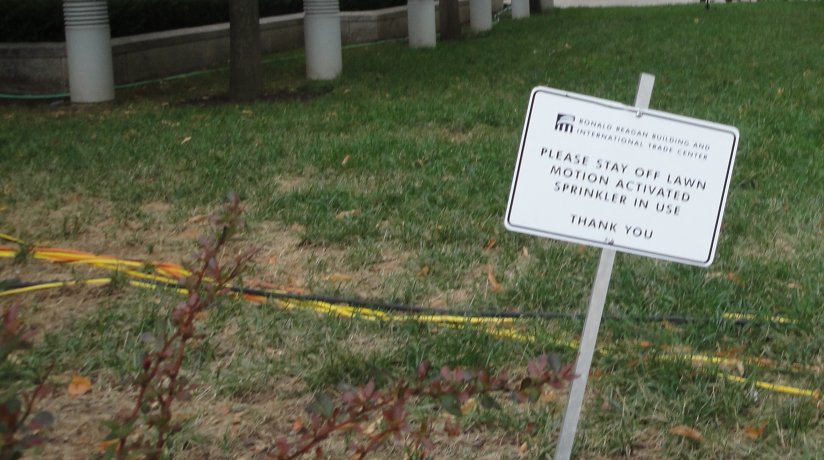
Writers lose control of their work as soon as somebody else reads it, since each reader will bring a different perspective and a different train of thought. If what was written is interesting, it will take on a life of its own. Readers may disparage the authors for claims they never made or praise them for insight they never had, but there is no use in authors trying to “correct” interpreters. Of course they can try to explain and get others to hop onto their own preferred train of thought, but the indignation some creative types feel when they find their work misinterpreted is inappropriate.
These are some of the insights I took away from a lecture by Patrick Allitt who talked about writing history during a Bradley lecture at AEI. Of course, as Allitt conceded, there are no truly new ideas and this concern with losing control of one’s ideas goes back at least as far as Plato. Plato purported to be concerned that his writings might be misused w/o him being there to explain and illustrate with examples. Of course, among ancient philosophers Plato was one of the most diligent about making sure that his works were copied and distributed widely, which is one reason we know Plato so well while many other ancient writers are known only in fragments or lost entirely. This illustrates the dilemma. Writers want to use the written word to communicate.They know, or should know, that their work may be misinterpreted, but they really still want to get it into the hands of those potentially unworthy consumers.

BTW – What you will be reading below will provide an example of the slippage Allitt (and Plato) talked about. I take Allitt’s comments as my starting point, but I will riff off that, so unless I mention him specifically, he may not be to blame for some of the ideas.
Allitt’s was talking about historical writing and writing about conservatism specifically and he acknowledged another problem for writers of history. Where do you start? You can always go “back to the beginning” but when you arrive there you find that the beginning has its own roots in the past and this goes back endlessly.

Allitt thinks that a good place to start talking about conservatism in the U.S. is with the Federalist. America doesn’t really have conservatism in the sense that they might in places with ancient roots. Nobody can seriously advocate a RETURN to royalty, feudalism or the old empire, because we never had any of those things. The United States of America is a creation of human endeavor with some specific starting dates. There were no “Americans” (in the sense of people of the U.S.) before 1776 or 1787 (if you prefer the Constitution), and you could even argue for a more recent date.
American conservatism, according to Allitt, is more of an attitude than a specific set of beliefs. It is a outlook that looks for support in historical precedents and in experience, rather than sweeping theories that purport to completely explain current reality, or at least history, and are able to prescribe yet untried comprehensive solutions. To be conservative is to not believe in comprehensive changes and to understand that there is no finish line or a utopia attainable on earth. Human nature and the challenges faced by people are similar enough that we can understand and learn from the experience of people in ancient times, even though their lives were very different.

Unlike Marxists, conservatives don’t have a good explanation for everything that happens. Marx thought up all sorts of stages and rules of history. He provided a good narrative and even non-Marxists get caught up in his stages. Marx explained how we move from feudalism to capitalism and he projected how we would move out of capitalism into communism. Marx even developed a good way to smack down non-believers. They were victims of “false consciousness.” This explained content workers or peasants. They just were too dumb and misguided to understand their own plight, according to Marxists.
Although Marx was wrong in all the important details of his theory, it is attractive to have a story line. It is particularly attractive to intellectuals, because it is complex and knowable only to those who really study it. Beyond that, Marxism provides a specific role for intellectuals as the vanguard of the proletariat. What more could the mediocre PhD student with poor job prospects ask for?
Conservatism, in contrast, doesn’t have a theory with neat stages, each leading forward to the ultimate utopia where everybody is fulfilled and nobody even thinks about carrying out aggressions against their neighbors. Conservatives understand that people want different things and even the same person changes his preferences with monotonous regularity. History has no overarching goal or directions, according to conservatives. This means that conservatives cannot project progressive history onto current events the way progressives can. This puts conservatives at a steep rhetorical disadvantage. People like to have a detailed story about where things are going to go, even if they understand that the story is wrong and the goals practically unattainable with the methods proposed or by the people designated.
Conservatives become an easy target for the label of “do nothing.” In the field of government, conservatives often do believe in doing nothing, or at least doing less by government. There is a paradox of conservatives in government, since they are using a tool (government) that they think should be used less or not at all in many situations. It is tempting to leave it to those who want to use it, but that is impossible.
You may want to ignore politics, but politics won’t ignore you. Since there is no op-out option, conservatives have the responsibility to op-in and take the heat for being against changes that will ostensibly mitigate misery and help solve the people’s problems. It is not that conservatives are unaware of these problems or that they don’t want them addressed, it is just that they understand that government, although indispensable within its own sphere, is not the proper tool to deliver many changes that the people want. Conservatives in the American tradition are in favor of many changes, but are less confident that government is the proper tool.
Perhaps the central paradox of conservatism in the United States, and to some extent in other free market places, is the conservatives defend the free market, which it the most revolutionary system in human history. The free market means constant change, but it is change that bubbles up from below, from diverse and unexpected sources. There is no direction that can be predicted in advance. Historians often create what looks like a progress narrative by weaving ex-post-facto weaving together disparate threads, but it wasn’t like that at the time. The test of any theory is its ability to predict future events, not merely explaining the past in what seems to be a coherent way. By that measure, all the fancy theories of historical inevitability have been wrong. The free market is a process, but not a plan. That is how it works and why it delivers such radical change w/o making the promise.
Cultures can go along for decades or centuries with few significant changes, but when market forces get to work, suddenly change comes fast and furious. It is one of the things “conservatives” in from non-market cultures most dislike. **
So the liberal-conservative divide (defining both terms in the modern American sense, since liberal & conservative mean very different things in different places and times) is not about change or no change. It is a difference of whether the primary agent of change should be centralized and government or distributed and non-governmental. It is also not an argument about government or no government. It is about the size and the roles government should play.
A few odd & ends from the Q&A – One of the questions concerned leadership. Allitt pointed out that conservatives tend to believe more in leadership as the agency of change or progress. Liberals tend to believe more in wider historical forces. This is no surprise, given the more general philosophical differences.
He also pointed out the good historians try to be fair and impartial, but that they really cannot, since they choose the subjects to study based on their interests, preferences and what they think are important subjects, focusing attention on some areas by necessity means neglecting others. People also write about what they like or are passionate about. It becomes very hard not to take sides.
Allitt said that if you feel very good after reading a history, it is probably poorly done, since the historians has created, perhaps, inadvertently, a good guy-bad guy narrative. No matter how they look in retrospect, nobody thinks of himself as the villain of the story and they don’t go into conflicts expecting to lose. Historians sometimes don’t consider the motivations and aspirations of the losers, or at least the other side. History is often the story of people doing very bad things, but perhaps it would be enlightening to understand why they thought they were good or at least expedient. On the other hand the “heroes” are also always flawed. We can recognize this w/o becoming cynical about the good people have done or absolutely despairing about the evil. There are lessons to be drawn from both.
Speaking of lessons, Allitt said that we should not take more from lessons that they have to teach. For example, after World War II, historians and leaders took the broad lesson that they had countries had acted too quickly and w/o sufficient compromise. That was what contributed to the terrible war. So in the 1930s, the Democracies were more accommodating – appeasing the dictators. We now look at that as a big mistake, but at the time it seemed like a good idea – “peace for our time.” The experience of World War II gave us the need to act and prevent countries from falling to dictators. This had its own downsides. In fact, each situation is different. What works in one time or place may be just the wrong thing to do in another. Of course, it is easy to see that in retrospect and much harder when you are making decisions in a climate of uncertainty.
Anyway, if you are interested in this subject, I suggest you watch for yourself. As I said, I started with Allitt’s talk, but extrapolated. If you want what he actually said, you have to listen to him.
BTW – Fox News is featuring a series on conservatism that starts tonight (Sunday)
The pictures in this piece are unrelated to the text. I just like to put in what scenes I have noticed recently.The top shows Jesus in front of the Cathedral of St Thomas Moore in Arlington. A similar but much bigger and more famous Jesus looks out over Rio de Janiero; this one looks out over US 50, maybe as far as Glebe Road. Below that is the U.S. Chamber of Commerce Building in Washington. It is across from the White House on Lafayette Park. Next is Thomas St in Arlington VA. I just like that neighborhood, mostly because of the big trees. I walk that way to FSI. Finally is Rochambeau, the French general who helped us win independence. He is in Lafayette Park.
BTW, for reasons I cannot explain, Rochambeau is also another name for the game rock-paper-scissors as well as for a stupid game some of us “played” as kids, which involves getting kicked in the groin. Actually, you didn’t play voluntarily and I never understood the rules. It usually resulted in a fight or a quest for revenge. I do not think there is a relation to the general.







